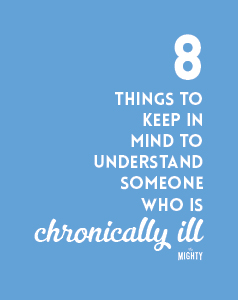When you have a chronic illness, there are a lot of things about everyday life that can be extremely difficult. In my experience, though, there is one thing that is harder than the rest.
• It isn’t the constant pain you feel.
• It isn’t the dozen pills you have to take every day, each with different side effects.
• It isn’t having to make the decision between being in pain or taking painkillers and feeling dopey, nauseous and sleepy.
• It isn’t the side effects: the nausea, the headaches, the cramps, the weakness, the brain fog, the bloating.
• It isn’t the overwhelming fatigue.
• It isn’t constantly catching bugs because your medications suppress your immune system.
• It isn’t the hundreds of doctor’s appointments attended.
• It isn’t being prodded with needles all the time.
• It isn’t crying because you need to walk upstairs and don’t have the energy to do so.
• It isn’t trying lots of different diets and cutting out foods to see what doesn’t affect you.
• It isn’t the days where getting out of bed is just impossible because of the pain.
• It isn’t knowing that there are people three to four times your age who are healthier than you.
• It isn’t the guilt you feel because you had to cancel on something again.
• It isn’t being told by doctors you’re going to have to deal with it because — besides managing it with various pills – there’s nothing they can do.
No, it’s the lack of understanding — the old “you don’t look sick” line that even those closest to you will use. Really, unless you’ve been through it, it is difficult to fully understand, and if that’s the case, be really thankful. It’s incredibly isolating knowing that most people you know don’t understand what you’re going through.
On social media, I post the best parts of my life, not because things aren’t that bad, but because what is there to gain from complaining to everyone?
People see what you want to show them, and if I don’t want to show the true depth of how ill I am, it’s because I don’t want to wallow or be negative. I just don’t see the point, and it’s awkward because most people don’t get it, especially the concept of not ever getting any better.
Please realize you might not understand or even have a frame of reference to understand. But if you want to try to understand, here are eight things you can keep in mind:
1. When someone says they feel better, maybe they’re trying to be positive or just feeling better than the horrid day they had before. It’s all relative!
2. Ask how it impacts their life. How far can they walk? How many hours a day are they in pain? What does it stop them doing? What do they wish they could do that they can’t?
3. Realize that doctors can’t fix everything. Sometimes all they’re trying to do is keep us alive or manage your symptoms (because that’s all they can do).
4. Realize that constantly being on lots of medications (at high doses) has a plethora of side effects. That alone can be disabling in itself, but don’t just tell us to stop our medications. We already wish we didn’t take them and, sadly, we need them since they may literally be keeping us alive.
5. Just be there. Sometimes we want to forget we’re sick and don’t want to talk about how we’re feeling. But sometimes we want to cry and mourn the lost future we thought we would have. It really is a grieving process.
6. It’s not our fault. We can take all the right medication, eat the right things, do everything we’re advised to do (and more) and still not get any better.
7. The effects of chronic conditions and their medications can mean we just get worse as more side effects cause their own damage.
8. There are a lot of different ways to encourage someone with a chronic illness. Sometimes pushing a person to do more is needed, but sometimes you have to reassure them that doing less is OK. Tell them they don’t need to compare themselves to what healthy people can do. Remind them their worth is not in what they can outwardly achieve. Send them a text to let them know you’re thinking of them. Let them know they have a safe space to complain a little when they need it.
We want to hear your story. Become a Mighty contributor here.
Lead photo source: Thinkstock Images


